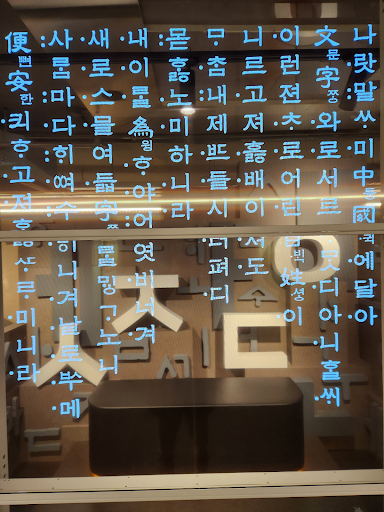
Though most would not have heard of such a holiday, Hangul Day is a commemorative holiday in Korea honoring the Korean alphabet. Last celebrated in early October, Hangul Day was also recognized by some members of the OHS community who highlight the importance and value of this holiday.
As its name suggests, Hangul Day celebrates the invention of Hangul, the Korean alphabet. Minji Kim (‘26), an OHS student who lives in South Korea, says that the importance of Hangul Day rests on Koreans’ value of their language. “It’s meaningful because Korean is one of the few languages in the world where the history of the language is very well-known and well-recorded,” she says.
Hangul was formed in 1443 by King Sejong as an alternative to Hanja, a Chinese-based alphabetic system less accessible to the common classes. The king and his advisors specially designed each consonant to resemble the shape of the speaker’s mouth in its pronunciation, and each vowel to represent three principles – the Heaven, Earth, and Humanity. Because it was created purposely rather than having evolved naturally like most alphabetic systems, Hangul is unique and represents a significant part of Korean identity.
“Holidays definitely have strong ties to history. Celebrating a holiday, or even just knowing the existence of a holiday, refreshes that history in your mind,” says Rebecca Ahn (‘25)
First celebrated on January 15th (1926), Hangul Day is currently dated as October 9. It is recognized as a national holiday that allows Korean citizens a day off from their jobs. Ahn recounts, “I used to ‘celebrate it’ [Hangul Day] when I was in Korea by putting up the Korean flag, as is customary for the 5 major national holidays. I also celebrated it by chilling, because there was no school on Hangul day.”
Hangul Day was also “celebrated” by the Korean Culture Club on October 13 with a meeting on the Korean language. Kara Lee (‘25), the club president, says that the meeting was meant to introduce the basics of Hangul to the attendees.
“To be honest, it was a bit of a happy coincidence that our meeting topic matched with Hangul Day, though I’m definitely not complaining,” she says. Because the attendees of the meeting were all familiar with Korean, they extended the discussion on Hangul to current Korean mannerisms as well.
Looking to the future, Lee expressed a wish for celebrating with the larger OHS community. “I obviously don’t expect OHS to give us the day off on Korean holidays, but it’d be fun to get collaborative acknowledgements or activities.”
